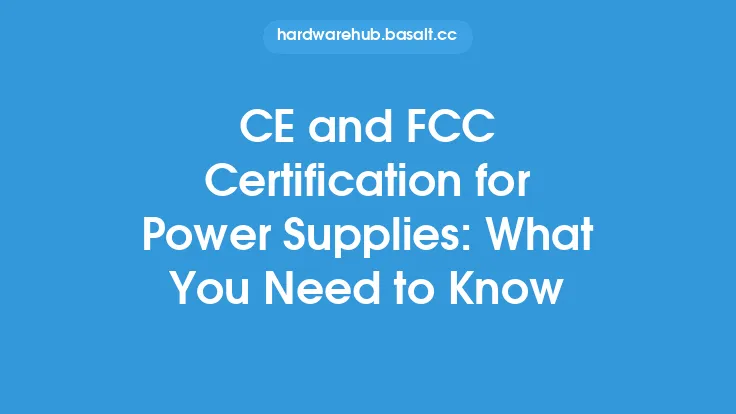Power supply certification is a critical aspect of ensuring the safety, reliability, and performance of power supplies used in various electronic devices, including computers, servers, and other equipment. Certification is a process where a third-party organization verifies that a power supply meets specific standards and requirements, providing assurance to consumers, manufacturers, and regulatory bodies that the product is safe and functions as intended. In this article, we will delve into the world of power supply certification, exploring its importance, types, and benefits.
Introduction to Power Supply Certification
Power supply certification involves a series of tests and evaluations to ensure that a power supply meets specific standards, such as those related to safety, efficiency, and electromagnetic compatibility (EMC). These standards are typically established by reputable organizations, such as the International Electrotechnical Commission (IEC), the Underwriters Laboratories (UL), and the Federal Communications Commission (FCC). The certification process typically involves a combination of laboratory testing, inspection, and documentation review to verify that the power supply meets the required standards.
Types of Power Supply Certification
There are several types of power supply certification, each with its own set of requirements and standards. Some of the most common types of certification include:
- Safety certification: This type of certification ensures that the power supply meets specific safety standards, such as those related to electrical shock, fire, and thermal hazards.
- Efficiency certification: This type of certification evaluates the power supply's efficiency, typically measured by its ability to convert AC power to DC power with minimal energy loss.
- EMC certification: This type of certification ensures that the power supply does not emit excessive electromagnetic radiation, which can interfere with other electronic devices.
- Environmental certification: This type of certification evaluates the power supply's environmental impact, including its energy consumption, waste generation, and recyclability.
Benefits of Power Supply Certification
Power supply certification offers several benefits to consumers, manufacturers, and regulatory bodies. Some of the most significant benefits include:
- Enhanced safety: Certification ensures that the power supply meets specific safety standards, reducing the risk of electrical shock, fire, and other hazards.
- Improved reliability: Certified power supplies are less likely to fail or malfunction, reducing downtime and increasing overall system reliability.
- Increased efficiency: Certified power supplies are designed to optimize energy conversion, reducing energy waste and minimizing environmental impact.
- Compliance with regulations: Certification ensures that the power supply meets relevant regulatory requirements, reducing the risk of non-compliance and associated penalties.
- Competitive advantage: Manufacturers who obtain certification for their power supplies can differentiate themselves from competitors and demonstrate their commitment to quality and safety.
The Certification Process
The certification process for power supplies typically involves several steps, including:
- Application: The manufacturer submits an application to the certifying organization, providing detailed information about the power supply, including its design, components, and testing data.
- Testing: The certifying organization conducts a series of tests to evaluate the power supply's performance, safety, and efficiency.
- Inspection: The certifying organization inspects the power supply's manufacturing facility to ensure that it meets specific quality control and manufacturing standards.
- Documentation review: The certifying organization reviews the manufacturer's documentation, including design files, test reports, and user manuals.
- Certification: If the power supply meets the required standards, the certifying organization issues a certificate, which is typically valid for a specific period.
Conclusion
Power supply certification is a critical aspect of ensuring the safety, reliability, and performance of power supplies used in various electronic devices. By understanding the importance, types, and benefits of power supply certification, consumers, manufacturers, and regulatory bodies can make informed decisions about the products they use and manufacture. As the demand for efficient, reliable, and safe power supplies continues to grow, the importance of certification will only continue to increase, driving innovation and excellence in the industry.





